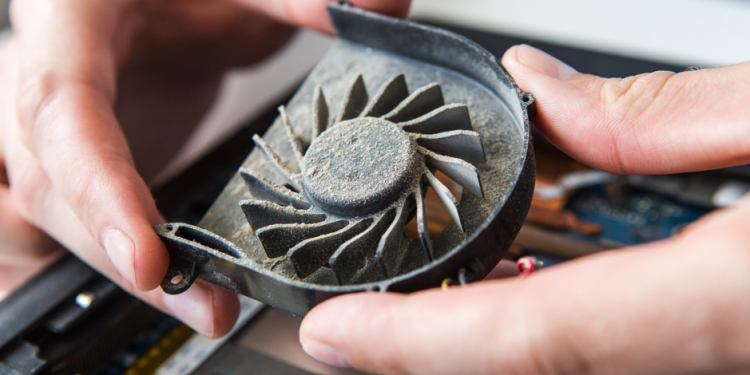Your laptop has carried you through spectacularly, from every client presentation to boring nights at home.
The ease and portability it provides when working and going about other daily activities cannot be beaten. But convenience has a cost.
The powerful computer you have in your hands generates a ton of heat. And as soon as temperatures rise, your laptop fan starts to scream in protest.
The questions that come begging now are: Why is your laptop fan making so much noise? And is there a way to make it run quieter?
In this article, we’re going to take you through 5 foolproof steps on how to make a laptop fan quieter. But first, let’s get into why it makes so much noise in the first place.
The reason why your laptop fan is making so much noise
Your laptop (including all your electronic devices) comes with a built-in fan to help regulate the temperature throughout its hardware. It does this by distributing air throughout and dispersing heat in the process.
So, if you’re worried about that weird noise coming from your laptop, the chances are that it’s just the fan doing its job.
However, it can get quite loud at times, especially as more heat is produced. You’ll notice this happen when you put your laptop on something soft, like your bed or lap. Soft surfaces impede airflow from the vents, making your laptop hotter and its fan work harder.
You’ve also probably noticed that happens when running heavy software, such as HD computer games.
It’s also possible that there might be other factors at play if your laptop is constantly overheating. But, for the purposes of this article, we’re going to focus on normal-running laptops that have loud fans.
With all these things considered, let’s dive into the five things you can do to make your laptop run quieter. Let’s begin.
#1 Exit unused apps running in the background
Depending on what your laptop is, you can opt to turn off or “kill” apps and processes that you’re not using.
For Mac users, pull up your Activity Monitor app and find which processes you can isolate and kill. For Microsoft users, on the other hand, your Task Manager is the app to look for.
You can avoid this from happening in the first place by preventing too many processes from opening when you start your computer.
Tweak your start-up settings and choose only your most used apps and processes to boot. For Mac, you can do this by going to System Preferences > Users > Startup. For Windows, go to your start-up folder.
#2 Use laptop coolers
A laptop cooler is plastic and/or metal platform with built-in heavy-duty fans. You simply turn it on and place your laptop on top to help dissipate heat from the outside.
These coolers come with wind controls, heat sensors, and USB hubs, depending on the model.
The question is, do you need it? The answer depends on how demanding your laptop’s tasks can get.
Laptop coolers are great if you are an avid gamer, use video rendering applications, or have a habit of running your computer for extended periods.
However, we want to reiterate that if your laptop is constantly overheating, then it may have other more serious issues.
#3 Clean your laptop
When was the last time you cleaned the insides of your laptop? It may have already accumulated dust, lint, or stray hair over time if you can’t remember.
These things can reduce airflow, causing your laptop to overheat. Cleaning your laptop manually is the only way to address this issue. But before you do this, make sure your computer is no longer under warranty, as opening it may void the agreement.
Also, if you’re not equipped to do this, ask a friend who knows how or seek a professional to help out.
When it comes to cleaning your computer, you need to turn it off first. Then prepare a screwdriver, a can of compressed air or a soft cleaning brush, and an anti-static wrist strap (to avoid damaging your internal hardware with static electricity).
Before you get started on cleaning vents, covers, internal hardware, and ports.
We’ve had good luck using short bursts of compressed air instead of long ones to remove dust and stray hairs on your computer fan and heat sinks. It ensures you don’t damage your internal hardware while blowing away debris.
#4 Use a third-party software
If physically cleaning your computer hardware doesn’t work, use third-party software that comes with built-in cleaning processes or laptop fan speed adjustments.
This also allows you to adjust your computer’s fan noise. The only caveat to using lower fan speeds is that it can increase your computer’s risk of overheating and, subsequently, reduce its lifespan.
#5 Consult an expert or consider replacing it
If none of the above works, then it’s high time to go to the experts or have your laptop fan replaced.
This is especially true if your fan is suddenly making weird noises, which a faulty bearing can cause. In this case, it might be easier to buy and install a new fan, depending on your computer’s make and model.
And there you have it — the five things you can do to address loud laptop fans. Carefully go through each one to address your issue, and let us know if they do the job!





